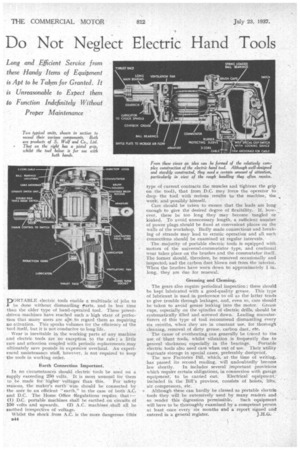Do Not Neglect Electric Hand Tools
Page 58

If you've noticed an error in this article please click here to report it so we can fix it.
Long and .Ejficient Service from these Handy Items of Equipment is Apt to be Taken for Granted. It is Unreasonable to Expect them io Function Indefinitely Without
Proper Maintenance
DORTABLEelectric tools enable a multitude of jobs to
be done without dismantling parts, and in less time than the older type of hand-operated tool. These powerdriven machines have reached such ahigh state of perfection that many users are apt:to regard them as requiring no attention. This speaks volumes for the efficiency of the tool itself, but it is not conducive to long life.
Wear is inevitable in the working parts of any machine and electric tools are no exception to the rule ; a little care and attention coupled with periodic replacements may ultimately save pounds in expensive overhaul. An experienced maintenance staff, however, is not required to keep the tools in working order.
Earth Connection Important.
In no circumstances should electric tools be used on a Supply exceeding 2;50 volts. It is most urnisual for them• -to he made for 'higher voltages than this. For safety reasons, the maker's earth—Wire should be connected by the user to an efficient "earth," in the case of both A.C. and D.C. The Home Office Regulations require that !— (1,) D.C. portable machines shall be earthed on circuits of
150 velts and upwards. (2) A.C. machines :shall all be earthed irrespective of voltage.
Whilst the shock .from A.C. is the more dangerous (this type of current contracts the Muscles and tightens. the grip on the tool), that from D.C. may force the operator to drop the tool with serious results to the machine, the work, and possibly himself.
Care should be taken to ensure that the leads are longenough to give the desired degree of flexibility. If, however, these be too long they may become tangled or kinked. To avoid unnecessary length, a sufficient number of power plugs should be fixed at convenient places on the walls of the workshop. Badly made connection and breaking of strands may lead to erratic operation and all such connections should be examined at regular intervals.
The majority of portable electric tools is equipped with motors of the universal-commutator type, and continual wear takes place on the brushes and the commutator itself. The former should, therefore, be removed occasionally and inspected, and the carbon dust blown out from the interior. When the brushes have worn down to approximately .1 in. long, they are due for renewal.
Greasing and Cleaning.
The gears also require periodical inspection ; these should be kept lubricated with a good-quality grease. This type of lubricant is used in preference to oil as the latter tends to give trouble through leakages, and, even so, care should be taken' to avoid grease leaking into the motor. Grease cups, especially on the spindles of electric drills, should be systematically tilled and screwed down. Leading manufacturers of this type of tool recommend dismantling every six months, when they are in constant use, for thorough cleaning, removal of dirty grease, carbon dust, etc.
The cause of overheating can generally be traced to the use of blunt tools, whilst vibration is frequently due to general slackness, especially in the bearings. Portable electric tools also need care when out of use. Their utility warrants storage in special cases, preferably dustproof.
The new Factories Bill, which, at the time of writing,• has paSsed it second reading, will undoubtedly become
law shortly. In includes several important provisions which require certain obligations, in connection with garage
equipraent, to be carried out. Electrical equipment:included in the Bill's provisos, consists of hoists, lifta, air compressors, etc.
▪ Although these can hardly be classed aS. portable electric tools they will be extensively used by many readers and SO render this digression permissible. Such equipment will have to be thoroughly examined by a competent person at least once every six months and a report signed and entered in a general register. J.H.G. "




























































































